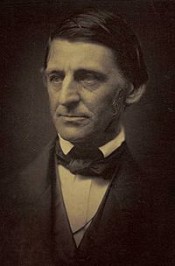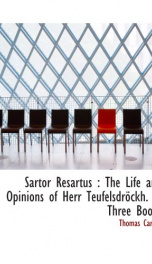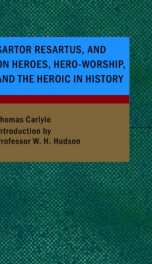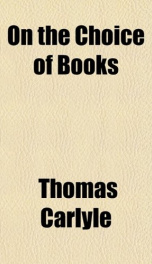Carlyle Thomas

Ralph Waldo Emerson (May 25, 1803 – April 27, 1882) was an American essayist, philosopher, and poet, best remembered for leading the Transcendentalist movement of the mid 19th century. His teachings directly influenced the growing New Thought movement of the mid 1800s.[1] While he was seen as a champion of individualism and prescient critic of the countervailing pressures of society. Emerson gradually moved away from the religious and social beliefs of his contemporaries, formulating and expressing the philosophy of Transcendentalism in his 1836 essay, Nature. As a result of this ground breaking work he gave a speech entitled The American Scholar in 1837, which Oliver Wendell Holmes, Sr. considered to be America's "Intellectual Declaration of Independence".[2] Considered one of the great orators of the time, Emerson's enthusiasm and respect for his audience enraptured crowds. His support for abolitionism late in life created controversy, and at times he was subject to abuse from crowds while speaking on the topic. When asked to sum up his work, he said his central doctrine was "the infinitude of the private man."[3] Emerson was born in Boston, Massachusetts on May 25, 1803,[4] son of Ruth Haskins and the Rev. William Emerson, a Unitarian minister who descended from a well-known line of ministers.[5] He was named after his mother's brother Ralph and the father's great-grandmother Rebecca Waldo.[6] Ralph Waldo was the second of five sons who survived into adulthood; the others were William, Edward, Robert Bulkeley, and Charles.[7] Three other children—Phebe, John Clarke, and Mary Caroline—all died in childhood.[7] The young Ralph Waldo Emerson's father died from stomach cancer on May 12, 1811, less than two weeks before Emerson's eighth birthday.[8] Emerson was raised by his mother as well as other intellectual and spiritual women in his family, including his aunt Mary Moody Emerson, who had a profound impact on the young Emerson.[9] She lived with the family off and on and maintained a constant correspondence with Emerson until her death in 1863.[10] Emerson's formal schooling began at the Boston Latin School in 1812 when he was nine.[11] In October 1817, at 14, Emerson went to Harvard College and was appointed freshman messenger for the president, requiring Emerson to fetch delinquent students and send messages to faculty.[12] Midway through his junior year, Emerson began keeping a list of books he had read and started a journal in a series of notebooks that would be called "Wide World".[13] He took outside jobs to cover his school expenses, including as a waiter for the Junior Commons and as an occasional teacher working with his uncle Samuel in Waltham, Massachusetts.[14] By his senior year, Emerson decided to go by his middle name, Waldo.[15] Emerson served as Class Poet and, as was custom, presented an original poem on Harvard's Class Day, a month before his official graduation on August 29, 1821, when he was 18.[16] He did not stand out as a student and graduated in the exact middle of his class of 59 people.[17] Around 1826, during a winter trip to St. Augustine, Florida, Emerson made the acquaintance of Prince Achille Murat. Murat, the nephew of Napoleon Bonaparte, was only two years his senior and the two became extremely good friends and enjoyed one another's company. The two engaged in enlightening discussions on religion, society, philosophy, and government.[18] After Harvard, Emerson assisted his brother in a school for young ladies[19] established in their mother's house, after he had established his own school in Chelmsford, Massachusetts; when his brother went to Göttingen to study divinity, Emerson took charge of the school. Over the next several years, Emerson made his living as a schoolmaster, then went to Harvard Divinity School. In May 1828, Emerson's younger brother William, who had been working with lawyer Daniel Webster, had to be sent to McLean Asylum.[20] Boston's Second Church invited Emerson to serve as its junior pastor and he was ordained on March 11, 1829.[21] Emerson met his first wife, Ellen Louisa Tucker, in Concord, New Hampshire and married her when she was 18.[22] The couple moved to Boston, with Emerson's mother Ruth moving with them to help take care of Ellen, who was already sick with tuberculosis.[23] Less than two years later, Ellen died at the age of 20 on February 8, 1831, after uttering her last words: "I have not forgot the peace and joy".[24] Emerson was heavily affected by her death and often visited her grave.[25] In a journal entry dated March 29, 1831, Emerson wrote, "I visited Ellen's tomb and opened the coffin".[26] After his wife's death, he began to disagree with the church's methods, writing in his journal in June 1832: "I have sometimes thought that, in order to be a good minister, it was necessary to leave the ministry. The profession is antiquated. In an altered age, we worship in the dead forms of our forefathers".[27] His disagreements with church officials over the administration of the Communion service and misgivings about public prayer eventually led to his resignation in 1832. As he wrote, "This mode of commemorating Christ is not suitable to me. That is reason enough why I should abandon it".[28] Emerson toured Europe in 1832 and later wrote of his travels in English Traits (1857).[29] He left aboard the brig Jasper on Christmas Day, sailing first to Malta.[30] During his European trip, he met William Wordsworth, Samuel Taylor Coleridge, John Stuart Mill, and Thomas Carlyle. Carlyle in particular was a strong influence on Emerson; Emerson would later serve as an unofficial literary agent in the United States for Carlyle. The two would maintain correspondence until Carlyle's death in 1881.[31] Emerson returned to the United States on October 9, 1833, and lived with his mother in Newton, Massachusetts until November 1834, when he moved to Concord, Massachusetts to live with his step-grandfather Dr. Ezra Ripley at what was later named The Old Manse.[32] In 1835, he bought a house on the Cambridge and Concord Turnpike in Concord, Massachusetts, now open to the public as the Ralph Waldo Emerson House,[33] and quickly became one of the leading citizens in the town. He married his second wife Lydia Jackson in her home town of Plymouth, Massachusetts[34] on September 14, 1835.[35] He called her Lidian and she called him Mr. Emerson.[36] Their children were Waldo, Ellen, Edith, and Edward Waldo Emerson. Ellen was named for his first wife, at Lidian's suggestion.[37] Emerson lived a financially conservative lifestyle.[38] He had inherited some wealth after his wife's death, though he brought a lawsuit against the Tucker family in 1836 to get it.[39] He received $11,674.79 in July 1837.[40] Emerson and other like-minded intellectuals founded the Transcendental Club, which served as a center for the movement. Its first official meeting was held on September 19, 1836.[41] Emerson anonymously published his first essay, Nature, in September 1836. A year later, on August 31, 1837, Emerson delivered his now-famous Phi Beta Kappa address, "The American Scholar",[42] then known as "An Oration, Delivered before the Phi Beta Kappa Society at Cambridge"; it was renamed for a collection of essays in 1849.[43] In the speech, Emerson declared literary independence in the United States and urged Americans to create a writing style all their own and free from Europe.[44] James Russell Lowell, who was a student at Harvard at the time, called it "an event without former parallel on our literary annals".[45] Another member of the audience, Reverend John Pierce, called it "an apparently incoherent and unintelligible address".[46] In 1837, Emerson befriended Henry David Thoreau. Though they had likely met as early as 1835, in the fall of 1837, Emerson asked Thoreau, "Do you keep a journal?" The question went on to have a lifelong inspiration for Thoreau.[47] On July 15, 1838,[48] Emerson was invited to Divinity Hall, Harvard Divinity School for the school's graduation address, which came to be known as his "Divinity School Address". Emerson discounted Biblical miracles and proclaimed that, while Jesus was a great man, he was not God: historical Christianity, he said, had turned Jesus into a "demigod, as the Orientals or the Greeks would describe Osiris or Apollo".[49] His comments outraged the establishment and the general Protestant community. For this, he was denounced as an atheist,[49] and a poisoner of young men's minds. Despite the roar of critics, he made no reply, leaving others to put forward a defense. He was not invited back to speak at Harvard for another thirty years.[50] The Transcendental group began to publish its flagship journal, The Dial, in July 1840.[51] They planned the journal as early as October 1839, but work did not begin until the first week of 1840.[52] George Ripley was its managing editor[53] and Margaret Fuller was its first editor, having been hand-chosen by Emerson after several others had declined the role.[54] Fuller stayed on for about two years and Emerson took over, utilizing the journal to promote talented young writers including William Ellery Channing and Thoreau.[47] In January 1842, Emerson's first son Waldo died from scarlet fever.[55] Emerson wrote of his grief in the poem "Threnody" ("For this losing is true dying"),[56] and the essay "Experience". In the same year, William James was born, and Emerson agreed to be his godfather. It was in 1842 that Emerson published Essays, his second book, which included the famous essay, "Self-Reliance." His aunt called it a "strange medley of atheism and false independence," but it gained favorable reviews in London and Paris. This book, and its popular reception, more than any of Emerson's contributions to date laid the groundwork for his international fame.[57] Bronson Alcott announced his plans in November 1842 to find "a farm of a hundred acres in excellent condition with good buildings, a good orchard and grounds".[58] Charles Lane purchased a 90-acre (360,000 m2) farm in Harvard, Massachusetts in May 1843 for what would become Fruitlands, a community based on Utopian ideals inspired in part by Transcendentalism.[59] The farm would run based on a communal effort, using no animals for labor, and its participants would eat no meat and use no wool or leather.[60] Emerson said he felt "sad at heart" for not engaging in the experiment himself.[61] Even so, he did not feel Fruitlands would be a success. "Their whole doctrine is spiritual", he wrote, "but they always end with saying, Give us much land and money".[62] Even Alcott admitted he was not prepared for the difficulty in operating Fruitlands. "None of us were prepared to actualize practically the ideal life of which we dreamed. So we fell apart", he wrote.[63] After its failure, Emerson helped buy a farm for Alcott's family in Concord[62] which Alcott named "Hillside".[63]
do you like this author?
What readers are saying
What do you think? Write your own comment on this book!
write a commentWhat readers are saying
What do you think? Write your own comment on this author!
write a commentBook list

Translations from the German (Vol 3 of 3)Tales by Musaeus,Tieck,Richter
Series:
Unknown
Year:
Unknown
Raiting:
3/5
Show more
add to favoritesadd In favorites

Past and PresentThomas Carlyle's Collected Works,Vol. XIII.
Series:
Unknown
Year:
Unknown
Raiting:
4/5
Show more
add to favoritesadd In favorites

History Of Friedrich II. of PrussiaFrederick The Great—Complete Table of Contents: 22 Volumes
Series:
Unknown
Year:
Unknown
Raiting:
2.5/5
Show more
add to favoritesadd In favorites
Book list

Translations from the German (Vol 3 of 3)Tales by Musaeus,Tieck,Richter
Series:
Unknown
Year:
Unknown
Raiting:
3/5
Show more
add to favoritesadd In favorites

Past and PresentThomas Carlyle's Collected Works,Vol. XIII.
Series:
Unknown
Year:
Unknown
Raiting:
4/5
Show more
add to favoritesadd In favorites

History Of Friedrich II. of PrussiaFrederick The Great—Complete Table of Contents: 22 Volumes
Series:
Unknown
Year:
Unknown
Raiting:
2.5/5
Show more
add to favoritesadd In favorites

The Life of Friedrich SchillerComprehending an Examination of His Works
Series:
Unknown
Year:
Unknown
Raiting:
3/5
Show more
add to favoritesadd In favorites
![[Einleitung zu:] Thomas Carlyle,Leben Schillers_cover](/img/standard/standard_book.png)
[Einleitung zu:] Thomas Carlyle,Leben Schillers
Series:
Unknown
Year:
Unknown
Raiting:
5/5
Show more
add to favoritesadd In favorites

Sartor Resartus: the life and opinions of Herr Teufelsdröckh
Series:
Unknown
Year:
Unknown
Raiting:
2.5/5
Show more
add to favoritesadd In favorites

Sartor Resartus, and On Heroes, Hero-Worship, and the Heroic in History
Series:
Unknown
Year:
Unknown
Raiting:
1.5/5
This book was converted from its physical edition to the digital format by a community of volunteers. You may find it for free on the web. Purchase of the Kindle edition includes wireless delivery.
Show more
add to favoritesadd In favorites

On the Choice of Books
Series:
Unknown
Year:
Unknown
Raiting:
1/5
Purchase of this book includes free trial access to www.million-books.com where you can read more than a million books for free. This is an OCR edition with typos. Excerpt from book: ADDRESS DELIVERED TO THE STUDENTS OF THE UNIVERSITY OF EDINBURGH. Gentlemen, I have accepted the office you have elected me to, and have now the duty to return thanks for the great honour done me. Your enthusiasm towards me, I admit, is very beautiful in itself, however undeserved it may be in regard to the object of it. It is a feeling honourable to all men, and one well known to myself when I was in a position analogous to your own. I can only hope that it may endure to the end that noble desire to honour those whom you think worthy of honour, and come to be more and more select and discriminate in the choice of the object of it; for I can well understand that you will modify your opinions of me and many things else as you go on. (Laughter and cheers.) There are now fifty-six years gone last November since I first entered your city, a boy of not quite fourteenfifty-six years ago to attend classes here and gain knowledge of allkinds, I know not what, with feelings of wonder and awe-struck expectation; and now, after a long, long course, this is what we have come to. (Cheers.) There is something touching and tragic, and yet at the same time beautiful, to see the third generation, as it were, of my dear old native land, rising up and saying, " Well, you are not altogether an unworthy labourer in the vineyard: you have toiled through a great variety of fortunes, and have had many judges." As the old proverb says, " He that builds by the wayside has many masters." We must expect a variety of judges ; but the voice of young Scotland, through you, is really of some value to me, and I return you many thanks for it, though I cannot describe my emotions to, you, and perhaps they will be much more conceivable if expressed in silence. (Cheers.) When this office was first p...
Show more
add to favoritesadd In favorites

On Heroes and Hero Worship and the Heroic in History
Series:
Unknown
Year:
Unknown
Raiting:
5/5
Show more
add to favoritesadd In favorites

History of Friedrich II of Prussia — Volume 21
Series:
Unknown
Year:
Unknown
Raiting:
3.5/5
Show more
add to favoritesadd In favorites

History of Friedrich II of Prussia — Volume 20
Series:
Unknown
Year:
Unknown
Raiting:
3.5/5
Show more
add to favoritesadd In favorites

History of Friedrich II of Prussia — Volume 19
Series:
Unknown
Year:
Unknown
Raiting:
3.5/5
Show more
add to favoritesadd In favorites
What readers are saying
What do you think? Write your own comment on this author!
write a commentif you like Carlyle Thomas try:
readers also enjoyed
What readers are saying
What do you think? Write your own comment on this author!
write a commentGenre
if you like Carlyle Thomas try:
readers also enjoyed
Do you want to read a book that interests you? It’s EASY!
Create an account and send a request for reading to other users on the Webpage of the book!

